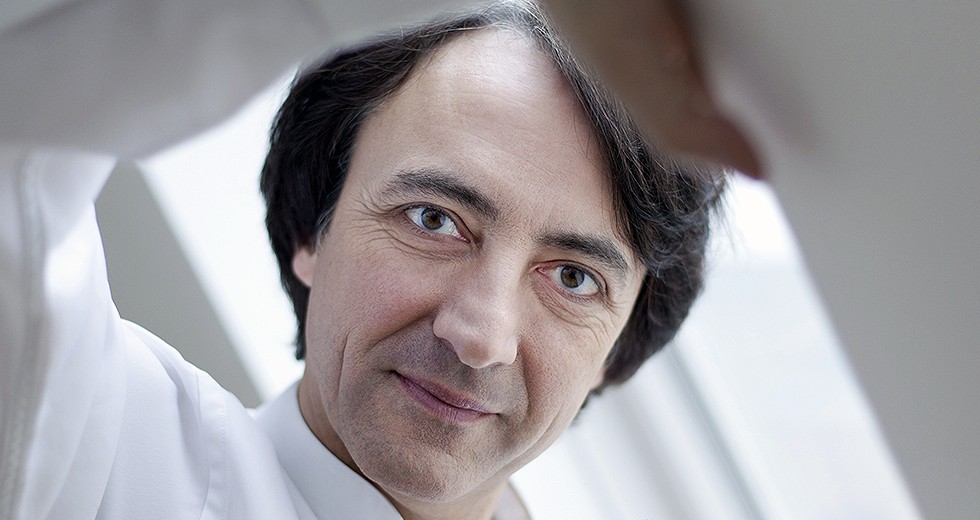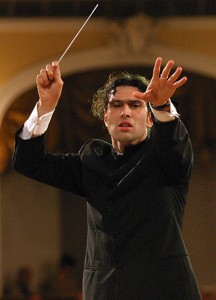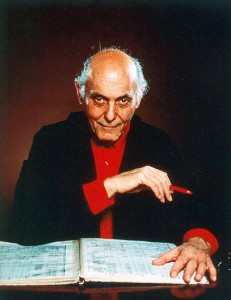
Jean-Efflam Bavouzet calls himself a “musical gourmand.” Although there are a few major composers whose music the French pianist doesn’t play — at least not yet — his musical interests range widely from Haydn and Liszt to Bartók and Stravinsky. His recording of the complete set of Prokofiev’s piano concertos won a 2014 Gramophone Award – the third time he has been tapped for the prestigious honor. “We pianists are so fortunate to have this enormous repertoire,” he said. “A lifetime is not enough to cover it all.”
The latest work he has added to his repertory is Rachmaninoff’s famed Rhapsody on a Theme of Paganini (1934). He will perform the concerto-like work with the London Philharmonic Orchestra, when it makes its first-ever appearance Oct. 18 at Orchestra Hall as part of an eight-concert North American tour (and as part of the Symphony Center Presents Orchestra Series).
“Rachmaninoff — I always loved his music. And frankly, who doesn’t?” said Bavouzet, speaking from a French town in Normandy near Rouen, where he lives in the former home of his famed teacher at the Paris Conservatoire, Pierre Sancan. He first picked up the score of Rachmaninoff’s Piano Concerto No. 2 when he was 19 or 20 years old and quickly dismissed the defiantly tonal work as passé when he learned it had been written not in the 19th century, as he had surmised, but well into the 20th century. “Of course, it was a very immature reaction,” Bavouzet said, “because in the end, who cares when the music was written if it’s good music?”
He later reconnected with the composer’s works, but he had never performed Rachmaninoff’s Piano Concerto No. 2 until earlier this year, when he performed in two concerts with conductor Vladmir Ashkenazy and England’s Philharmonia Orchestra.
“The Paganini Rhapsody is a work where you really admire how brilliantly Rachmaninoff used the theme,” Bavuozet said. “He was always very good in variations. You have the Corelli Variations, which is one of his masterpieces. He uses all the possible tools a little bit in the Beethovenian sense in order to achieve a real rhapsody. It’s interesting that he doesn’t call it Theme and Variations but he calls it a Rhapsody because he builds the entire variation cycle into an epic journey. It’s a fantastic piece to play.”
“Not easy!” he added, following it with the French exclamation, “Hoo-hoo!”
Leading the London Philharmonic’s North American tour will be Vladimir Jurowski, its fast-rising principal conductor. “He has a wonderful, precision technique,” Bavouzet said. “His rhythm is absolutely crystal clear, and I have the feeling that we really do feel rhythm the same way.”
Jurowski does not move much on the podium, Bavouzet said, but when he needs to, he can summon tremendous force from the orchestra. That was certainly the case, the pianist said, during Shostakovich’s Symphony No. 8, which the London Philharmonic performed Sept. 24 during a program that was much the same as the one it is bringing to Chicago. “From my point of view,” Bavouzet said of the conductor, “he belongs among the most talented and thoughtful conductors that I’ve worked with.”
Bavouzet’s international recognition arguably does not match his talent or achievements, because the pianist, who turns 52 on Oct. 17, has had something of a late-blooming career. In 1989, time when he was first beginning to generate acclaim, his right hand was afflicted with functional dystonia — a condition that affects voluntary body movement and typically causes considerable pain. He fought the malady for four years and was ultimately healed. “It’s hell, I can tell you,” he said. “Many pianists were not as lucky as I was, meeting the right people and having good advice.”
Among the musicians who have been important to his development, three happen to be Hungarian-born, including two with whom he collaborated at key junctures – pianist Zoltán Kocsis and János Starker. The latter served as principal cellist of the Chicago Symphony for five seasons under music director Fritz Reiner.
But perhaps most important person in this group was Sir Georg Solti, CSO music director from 1969 through 1991. The two met in Switzerland in 1995, and Solti invited the pianist to play privately for him in Paris in March 1996. Solti was in the French capital to conduct concert performances of Don Giovanni for the reopening of the Palais Garnier, the city’s celebrated 19th-century opera house, after extensive renovations. “That’s something that doesn’t happen every day, that a maestro of the stature of Solti is asking you to play for him,” Bavouzet said. “I think he liked my playing. I remember his first remark was, ‘How come I’ve never heard about you before?’”
Bavouzet played several more times for the conductor in Paris and in his home in London, with Solti sometimes offering coaching. Then on June 17, 1997 (Bavouzet remembers the exact date), during a visit to London, the conductor handed him a letter from the Orchestre de Paris, agreeing to engage the pianist as Solti’s soloist for concerts in early 1998 that included Bartok’s Piano Concerto No. 3. “Playing Bartok with him was really a dream come true,” the pianist said of his debut with that ensemble. But it was not to be. Solti died later that year.
The end of one musical relationship, however, opened the door to another with famed French conductor and composer Pierre Boulez, who took over Solti’s concerts in Paris. They began to work together, and Boulez, now the CSO’s Helen Regenstein Conductor Emeritus, wrote a foreword for the printed edition of Bavouzet’s transcription for two pianos of Jeux (“Games”) (1913), Debussy’s final work for orchestra.
Although the two were never able to perform together, Bavouzet considers his time with Solti among the most important influences on his life. Indeed, as a kind of tribute, he plans to don a tailcoat once owned by the maestro for his upcoming concert in Chicago — only his second in the city since he appeared in Orchestra Hall as part of a tour with the Orchestre de Paris.
Another significant figure in his career has been noted conductor Vladmir Ashkenazy, who helped Bavouzet secure a London agent as well as a recording contract with Chandos. The soloist’s first recording for the respected London-based label was a set of Debussy’s complete piano music, released in five volumes in 2007-2009. He has since gone on to record a wide range of music, including Janáček’s Capriccio, which is featured on an album released in September of the Czech composer’s orchestral works.
In the past, it was common to associate French pianists only with the music of Gallic composers; Bavouzet, with his expansive musical tastes, and other contemporary keyboard colleagues have fractured such stereotypes. But that does not mean that he does not have a strong feeling for the music of his native land, especially the works of Ravel. “I’ve had, almost from the time I first began playing the piano, a close connection with Ravel,” he said. “I always have had a sense, even if it might have been wrong, of how it should be played. In a way, I felt very French. I felt my French passport with Ravel.”
Debussy, however, was a later discovery. When he was a student, his teacher Sancan talked to him about the grandeur and almost “unbearable emotion” of the composer’s music. “At that time, in my early 20s,” Bavouzet said, “I had no idea what he was speaking of.”
But by the time he was in late 30s, he began to understand and appreciate Debussy, and now he has been “infected” by the composer’s music, though in a more intellectual way that his innate connection with Ravel. “It was a long maturation, and the result of very hard work,” Bavouzet said. “In other words, I used to say that when I play Ravel, I feel French, but when I play Debussy, I feel like a musician.”
Kyle MacMillan, former classical music critic of the Denver Post, is a Chicago-based arts writer.

